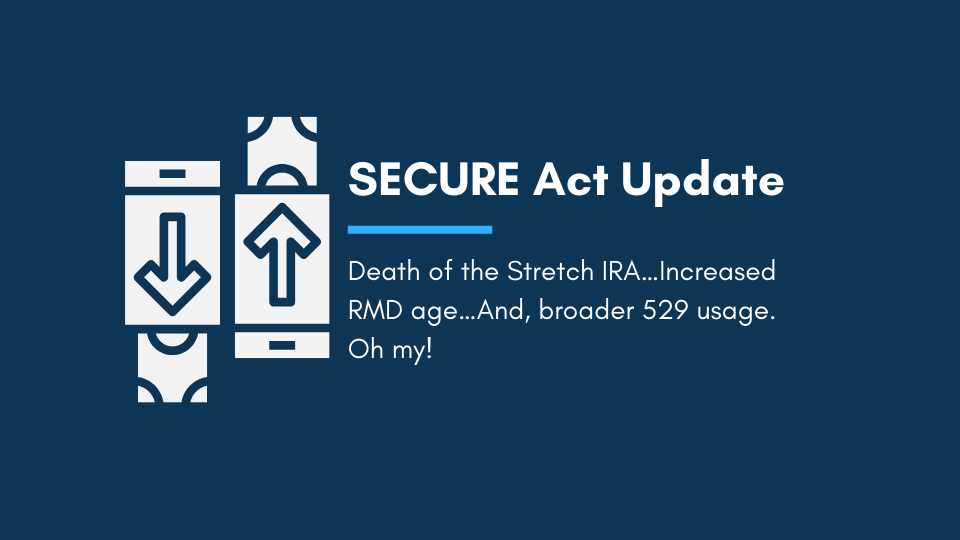
Understanding the Deductibility of Meals for 2024 Tax Returns
Proper classification of meal expenses can help businesses maximize deductions while staying compliant with IRS regulations. Here’s what business owners need to know: 1. 50%…


The Act does away with the ability to “stretch” required minimum distributions (“RMDs”) over their lifetime. This is not retroactive, so it will not affect beneficiary IRAs already in existence, only those created on or after 1/1/2020. This means that starting this year, beneficiaries who inherit IRA monies will now be required to fully distribute those accounts within 10 years.
However, the Act does provide a carve-out for certain types of beneficiaries, still allowing for a “stretch” over their lifetime. This includes beneficiaries that fall into one of the following categories:
What does this mean? You should reexamine whether your beneficiary designations and estate plan still accomplish your goals as changes may be necessary.
While many beneficiaries of retirement accounts will not be as well off, the actual owners will see positive changes.
The age at which an individual must begin taking required minimum distributions from their account has been raised from 70 ½ to age 72. This only applies to individuals who will not have turned 70 ½ prior to 1/1/2020. For all those who have already reached that age, you must continue to take RMDs.
Individuals can now continue making contributions to their IRA beyond the age of 70 ½.
Both of these provisions address the fact that individuals are simply living longer than they have in the past.
The bill expands what qualifies as an allowed distribution from a 529 plan. 529 plans can now be used to pay for registered apprenticeships and up to $10,000 of qualified student loan repayments. Just make sure that the distribution is also okay with your state because not all states follow the federal guidelines, and an improper distribution could create unplanned early withdrawal penalties.
This is not a complete overview of all the changes in the SECURE Act. There are changes we haven’t covered here; we also won’t know the ramification of some these changes for some time. We will continue to review and analyze these changes and look forward to discussing with our clients in the days and weeks ahead.
If you aren’t a client and want to discuss how these changes may affect you, please reach out to us and let us know if we can help.
Please remember that past performance may not be indicative of future results. Different types of investments involve varying degrees of risk, and there can be no assurance that the future performance of any specific investment, investment strategy, or product (including the investments and/or investment strategies recommended or undertaken by Beaird Harris Wealth Management, Inc.), or any non-investment related content, made reference to directly or indirectly in this blog will be profitable, equal any corresponding indicated historical performance level(s), be suitable for your portfolio or individual situation, or prove successful. Due to various factors, including changing market conditions and/or applicable laws, the content may no longer be reflective of current opinions or positions. Moreover, you should not assume that any discussion or information contained in this blog serves as the receipt of, or as a substitute for, personalized investment advice from Beaird Harris Wealth Management, Inc. To the extent that a reader has any questions regarding the applicability of any specific issue discussed above to his/her individual situation, he/she is encouraged to consult with the professional advisor of his/her choosing. Beaird Harris Wealth Management, Inc. is neither a law firm nor a certified public accounting firm and no portion of the blog content should be construed as legal or accounting advice. A copy of the Beaird Harris Wealth Management, Inc.’s current written disclosure statement discussing our advisory services and fees is available for review upon request.

Proper classification of meal expenses can help businesses maximize deductions while staying compliant with IRS regulations. Here’s what business owners need to know: 1. 50%…

President Trump signed legislation repealing IRS reporting rules for decentralized finance (DeFi) platforms, easing compliance burdens but leaving individual taxpayers responsible for accurate crypto reporting.

Certain non-traditional investments held in an IRA — like active business interests or leveraged real estate — can trigger Unrelated Business Income Tax (UBIT), potentially…
Schedule a complimentary call today. We’ll help you get started and learn more about Beaird Harris.